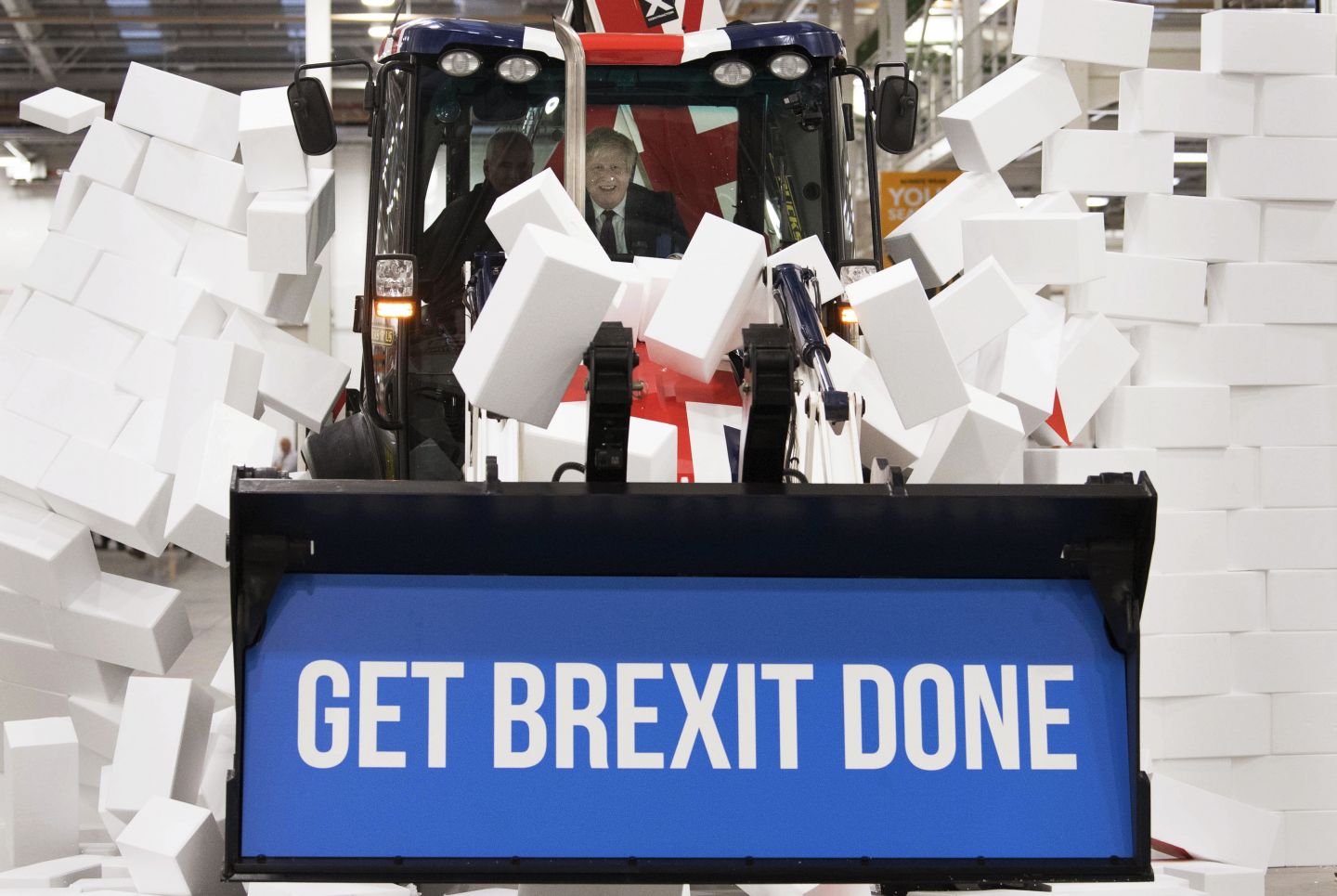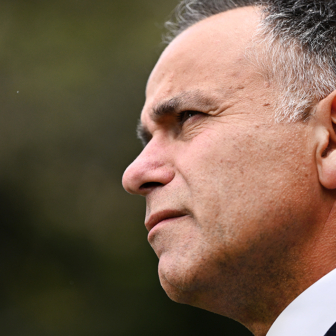“In all my years filming elections, I’ve long suspected that certain candidates have set up friendly voters to make them look more popular. But this is the first time we’ve caught one blatantly in the act.” Trust a formidable reporter to scoop a comedic grain from Britain’s sunken general election. In Ashfield, a former coalmining town and Labour-held marginal in England’s east midlands, Michael Crick — having made the intriguing move from left-leaning Channel 4 News to the right-wing Daily Mail’s video team — joins the Conservative hopeful, Lee Anderson, for a spot of canvassing. Lee is already a headliner in the area: a Brexit-supporting Labour defector who wants misbehaving council tenants downgraded to tents and put under military discipline.
As they prepare to set off from the town square, Lee is accosted by a resident, Jennifer Barker, who coolly lambasts him as a racist and misogynist given to “whipping up prejudice.” He is also shown making a furtive call warning Steve, the constituent he plans to doorstep, not to let the visitor from London know they’re pals. When the clumsy ruse dissolves, the ex-pitman’s “you’ve killed my career” feels unfazed, as if he’s quite enjoying the attention. In context, Crick’s endnote is a touch ponderous: “A lesson to us, journalists and viewers, that in this world of fake news, we should be a little more sceptical about what we see on screen.”
Ashfielders are blunt, the kind of trait that a media presence tends to amplify. Labour candidate Natalie Fleet tells the Economist of a male constituent who raged against her party’s votes-at-sixteen policy. I was a mother at that age, said Natalie. “Well, you should have kept your legs closed.” “Well, you can fuck off.” A vote lost, then? Not necessarily. Ashfield is “perhaps the strangest seat in Britain, with enough characters and subplots to fill a political soap opera,” says the newspaper. The seat’s three-way contest, with the insurgent Ashfield Independents also pitching to overturn Labour’s 441 majority in 2017, lures party strategists and media outlets alike.
Around a hundred near-marginals, out of 650 first-past-the-post races, will decide the colour of the next parliament. The most competitive include historic Canterbury, where a student vote helped Labour take the 185-year Conservative bastion by, yes, 185 votes in 2017; Crewe & Nantwich in the northwest, which Labour snatched by forty-eight; and North-East Fife, where a Scots nationalist is defending a two-vote margin from Liberal Democrat and Tory contenders.
In England, whispers of volatility reach to Workington in the far northwest, with its 3925 Labour majority. Were the Conservatives to win coastal Cumbria’s ex-mining redoubt, a few miles and a world away from the famed Lake District’s western fringe, a renewal of Boris Johnson’s Downing Street tenure would be assured. Indeed, this campaign kicked off with a flurry over “Workington Man,” distant offspring of 1990’s (Thatcherite) Essex Man and 2001’s (New Labour) Worcester Woman as a London politico’s idea of the must-have voter. Today’s version — according to Onward, a centre-right “ideas factory” — is a middle-aged grafter, fan of rugby league and Brexit, now notionally ready, like his peers in similarly neglected towns, to junk Labour red for Conservative blue.
This newly identified beast was soon being avidly scouted by journos in search of earthy wisdom, then just as quickly discarded until the post-election inquests. But the passing frenzy served to focus attention on a churning electoral market, in which voters’ greater readiness to shop around intersects in unpredictable ways with Brexit’s effect of polarising much of the electorate into “leave” and “remain” camps. The British Election Study finds that 49 per cent of voters didn’t vote for same party across the general elections of 2010, 2015, and 2017. Two years ago, 40 per cent of Labour’s voters switched to the party during Jeremy Corbyn’s vigorous campaign.
Such volatility makes for caution about the result tomorrow. Both 2015’s Conservative majority and 2017’s hung parliament came as exit-poll stunners at 10pm on election night. Most projections this time veer between those two outcomes. Current indicators — a Tory squeeze of the upstart Brexit Party to reach 42–43 per cent of vote share, a Labour creep to 33–34 per cent at LibDem expense, and the Scottish National Party’s guaranteed forty or so seats — could produce either. On election eve, YouGov’s vaunted MRP model projects an overall Conservative majority of twenty-eight, down from sixty-eight a fortnight ago.
Much depends on how strong Labour’s northern “red wall” proves to be, and how vulnerable southern Tory seats are to the anti-Brexit LibDems. Amid larger uncertainty, those local jousts and regional swings will be pivotal. So will variable weather on a deep-winter, pre-Christmas Thursday, which may affect turnout. This time, excuses for defeat might well be more entertaining than the election has been.
The campaign has had a bad press. Boring, joyless, dire, empty and depressing, say many commentators. Sheer length underlies the mood: after a pretend war lasting months, a few weeks of round-the-clock airtime for yet more repetitive hyperbole can hardly create a spark. Brexit’s unrelieved four years, and politics’ banal colonisation of every crevice of public life, add to the mix. What else should be expected?
Especially so, given that fragmentation now extends as much to election campaigning as to the political system, its parties, and the United Kingdom itself. The comforting surface of leaflets and rallies, head-to-heads and vox pops is reduced ever more to a palliative, while unseen marshals deploy much sharper tools of viral grooming — attack ads, rousing videos, targeted messages — to hustle key demographics towards the voting booth. No wonder modern elections feel so elusive, in a Kundera-like “life is elsewhere” sort of way, and to many, so frustrating.
Michael Crick himself observes “almost a conspiracy between politicians and journalists to pretend there is a vibrant contest on the ground. In reality, most voters have no personal contact from candidates beyond a few leaflets. That seems true even in many marginal seats.” What’s left of elections is a wall of noise: both ubiquitous and ungraspable.
But lay aside expectations, and the imprint of this deep background is tangible. The Tory high command is haunted by 2017, when a dud leader and stuffed manifesto led to a calamitous victory. This time, a risk-averse Conservative document has helped shield a distrusted Boris Johnson from close policy scrutiny and allow him space to bore “get Brexit done” into every voter’s skull. At headquarters, Isaac Levido and his Kiwi partners Sean Topham and Ben Guerin — credited with Scott Morrison’s win in May — lead an agile online strategy of experimental provocation, pithy sloganeering and constant rebuttal. Move fast and shake things, give Boris his lines, and let his presence do the rest: it’s not pretty but it is coherent.
By contrast, Labour’s sense of its near miss last time has prompted a straight remix at even higher volume. The proposed state control of capitalism, its £83 billion (A$161 billion) starter cost to be conjured up by taxes on high earners, runs with the grain both of Jeremy Corbyn’s lifelong ideology and his makeover of the party since 2015. That brings a catch: his often-popular ideas are sold with vengeful rhetoric that lifts believers but worries the unattached. This matters more as Corbyn himself is both better known than in 2017 and anathema even for many traditional Labour supporters. The ten leadership approval polls since mid November, gathered by five companies, have given him an average net rating of –39.5 per cent, against Johnson’s –5.3 per cent.
For all their flaws, Johnson and Corbyn have been their party’s undisputed figureheads in interviews, staged workplace or hospital visits, and at gatherings of the faithful. The prime minister often seemed distracted, the opposition leader flat. The whole circus’s robotic air and want of electricity again suggested, for all the accompanying hype, a backroom script. True, the BBC’s half-hour studio debate, after a dismal one on ITV, offered a good contrast between Corbyn’s lucid if formulaic droning, honed by decades of all-purpose platform speeches with no stopwatch, and Johnson’s digressive burbling, a hit-and-miss procession of forays and darts that equally eludes skewering. Jellyfish met butterfly, the result — despite the ludicrous avidity of rival post-match “spin room” teams — a tie.
The Boris–Jeremy duopoly sucked up much of the TV oxygen, and made the contest look heavily male. Still, the LibDems’ Jo Swinson — hyperactive, green, feminist and Europhile, like her party — contrived to miss the breakthrough bus. Her initial branding as “next prime minister” was absurd, her promise to cancel Brexit by fiat (“let’s make all this go away” in the ineffable words of her brief rival Layla Moran) felt undemocratic even to many remainers. Swinson’s own average poll rating is –24.5 per cent. But if the party over-promised, its energetic focus on target seats could garner high-profile Tory scalps such as foreign secretary Dominic Raab.
Adding lustre to the LibDems are the smooth Chuka Umunna and the dauntless Luciana Berger, ex-Labour centrists and Corbyn critics, and the ex-Tory rising star Sam Gyimah, all now standing in Tory-held London marginals. The first two reached the LibDems via the short-lived Independent Group (created in February, an aeon ago in British politics). Berger’s experience of sustained anti-Semitism in Corbyn’s party, a scourge whose scale and depths are still being uncovered, is echoed by many others in a party once seen as British Jews’ primary political home. Their fear of a Corbyn premiership is real.
For their part, ex-Tories standing as independents, such as Dominic Grieve, are backed by grandees from the 1980s and 90s — John Major, Michael Heseltine, Chris Patten — whose raging embitterment against Brexit and Johnson, reminiscent of postwar empire loyalists, is accorded reverence on the BBC. On the Labour side, Gordon Brown, an addictive thunderer of doom, similarly resembles a lost soul from a distant era. Of this caste, Tony Blair alone retains the capacity to make an actual argument about Britain and Europe now, misguided though his call for a hung parliament is. (Juliet Samuel, who sees politicians’ abandonment of responsibility as today’s fulcrum, writes in a brilliant column: “Rather than defending liberal democracy, a hung parliament would only endanger it more.”) Nonetheless, given the self-inflicted wreckage of the more demented remainers, Blair’s relative sanity could still be influential.
If the above broadcasting reference is not gratuitous, it’s because the shallowness of much political coverage may become unignorable after the election. The best of BBC journalism is excellent, but is submerged in a trivialising and patronising sea. To be fair, the networks’ problems overlap with those of politics as a whole, with both sides now existing in the shadow of voracious social media and spending most of their energies trying desperately to keep up. That dynamic visibly turns fine journos, and mediocre politicians, into manic puppets.
Some impresarios of the bearpit, on BBC and C4 in particular, but also ITN and Sky, now act less as public-service journalists than as squall merchants for social media. A gleaming exception is Andrew Neil, ex-Sunday Times editor turned incisive BBC interviewer, who above all works for his supper and thus allows the viewer-citizen to share it (in both old and new senses). His granular, relentless dissections of Corbyn’s economic illiteracy and of Nicola Sturgeon’s abysmal record as Scotland’s first minister were joyous in great part for being unheard of — and this after the two leaders’ four and five years in charge — but mainly for the quasi-dissident thrill of “Blimey, is this allowed before the watershed?!”
Neil didn’t net the butterfly, however, for Johnson avoided his show with lame dissembling. The interrogator then, after a studied demolition of Nigel Farage, challenged the PM direct to camera on this “question of trust.” It was a huge viral hit, and no more. Johnson’s evasion looked cowardly, though the shoddy snub may also reflect his notable obedience to the Tory campaign playbook. In turn, Michael Grade, respected former TV executive, responded that Neil’s reaction “crosses a line” of impartiality, and went on to criticise his and C4’s “empty chairing” of politicians who decline to appear. “Neither the BBC nor ITN [which supplies C4] is Fox News — yet.”
If modern politics lives ever in the moment, this election is no exception. Its disruptive events are already consigned to the great churning maw — flooding in Yorkshire, an Islamist atrocity, Trump’s presence at a nervous NATO summit — though Johnson’s “empathy bypass” (© Jo Swinson) on Monday when shown a distressing hospital photo might linger until voting day. In parallel, the world — Hong Kong, Iraq, Ukraine, Chile, Lebanon, China’s Uyghurs, Zimbabwe, Australia’s blazing eastern states, even the WTO’s fraying, to name only a few — made no imprint. In these times, Britain’s amnesia is reflexive, its bubble impermeable.
Much needs to change to let memory, light and the world flood back in, and so to move forward. Everyone will have their own ideas about what that change should be. In my long-held view, a clear government, leadership and direction is the sine qua non. Juliet Samuel is so right: “[A] democracy can only learn by doing, not by trying to wind back the past… Blame is a risk inherent in any action. If there is no one to blame, there is no democracy.”
But what do the people want, and what does their decision make possible? Soon, Britain will find out. •




